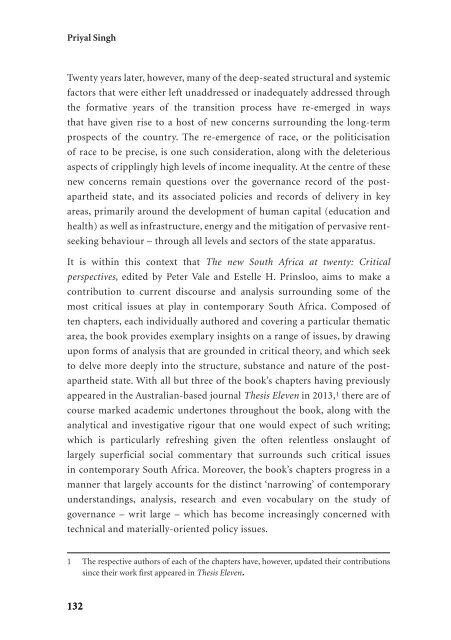ACCORD-ajcr-2015-1
ACCORD-ajcr-2015-1
ACCORD-ajcr-2015-1
- No tags were found...
Create successful ePaper yourself
Turn your PDF publications into a flip-book with our unique Google optimized e-Paper software.
Priyal Singh<br />
Twenty years later, however, many of the deep-seated structural and systemic<br />
factors that were either left unaddressed or inadequately addressed through<br />
the formative years of the transition process have re-emerged in ways<br />
that have given rise to a host of new concerns surrounding the long-term<br />
prospects of the country. The re-emergence of race, or the politicisation<br />
of race to be precise, is one such consideration, along with the deleterious<br />
aspects of cripplingly high levels of income inequality. At the centre of these<br />
new concerns remain questions over the governance record of the postapartheid<br />
state, and its associated policies and records of delivery in key<br />
areas, primarily around the development of human capital (education and<br />
health) as well as infrastructure, energy and the mitigation of pervasive rentseeking<br />
behaviour – through all levels and sectors of the state apparatus.<br />
It is within this context that The new South Africa at twenty: Critical<br />
perspectives, edited by Peter Vale and Estelle H. Prinsloo, aims to make a<br />
contribution to current discourse and analysis surrounding some of the<br />
most critical issues at play in contemporary South Africa. Composed of<br />
ten chapters, each individually authored and covering a particular thematic<br />
area, the book provides exemplary insights on a range of issues, by drawing<br />
upon forms of analysis that are grounded in critical theory, and which seek<br />
to delve more deeply into the structure, substance and nature of the postapartheid<br />
state. With all but three of the book’s chapters having previously<br />
appeared in the Australian-based journal Thesis Eleven in 2013, 1 there are of<br />
course marked academic undertones throughout the book, along with the<br />
analytical and investigative rigour that one would expect of such writing;<br />
which is particularly refreshing given the often relentless onslaught of<br />
largely superficial social commentary that surrounds such critical issues<br />
in contemporary South Africa. Moreover, the book’s chapters progress in a<br />
manner that largely accounts for the distinct ‘narrowing’ of contemporary<br />
understandings, analysis, research and even vocabulary on the study of<br />
governance – writ large – which has become increasingly concerned with<br />
technical and materially-oriented policy issues.<br />
1 The respective authors of each of the chapters have, however, updated their contributions<br />
since their work first appeared in Thesis Eleven.<br />
132


